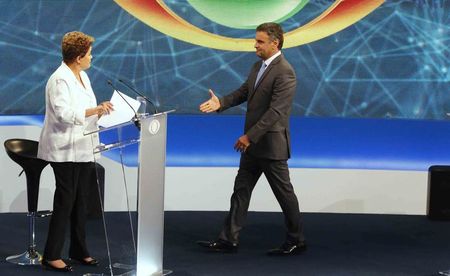BRASILIA (Reuters) - Opposition candidate Aecio Neves is running neck-and-neck with leftist incumbent Dilma Rousseff on the eve of a runoff vote that will decide Brazil's presidential election, a poll published on Saturday said.
Brazilians vote on Sunday in the closest election in decades between a pro-business senator who is promising to revive a stagnant economy and a Workers' Party president who vows to protect social programs that have lifted millions from poverty.
Neves has 45.3 percent voter support against 44.7 percent for President Rousseff, the survey by the smaller MDA research company said. Brazil's more closely watched polling firms are giving Rousseff a 6- to 8-percentage point lead.
Excluding undecided voters, spoiled and blank survey responses, Neves has 50.3 percent of the valid votes against 49.7 percent for Rousseff, the MDA showed. The gap between them is well within the poll's margin of error of plus or minus 2.2 percentage points and is considered a statistical tie.
The MDA poll commissioned by the transport industry lobby CNT surveyed 2,002 people between Thursday and Friday.
Brazil's top polling firms Datafolha and Ibope will release their final polls on Saturday night on the newscast of Brazil's TV Globo network just hours before voting stations open.
In a last attempt to sway some 10 percent of undecided voters, the candidates traded accusations over political corruption on Friday night in the final television debate.
Rousseff and Neves sparred over who was best suited to restore growth to Latin America's largest economy, fight high inflation, bring down rents and deal with open sewers in Brazilian cities.
The campaign has been overshadowed by a bribery scandal at Brazil's largest enterprise, state-run oil company Petroleo Brasileiro SA (SA:PETR4), which has given Neves ammunition to try to convince Brazilians to end 12 years of Workers' Party rule.
The weekly magazine Veja reported on Friday that a jailed black market money dealer called Alberto Youssef has told police and prosecutors that Rousseff and her predecessor, Workers' Party founder Luiz Inacio Lula da Silva, knew about the corruption scheme that allegedly funnelled cash to the ruling Workers' Party and its coalition allies.

Brazil's Superior Electoral Court denied a Workers' Party request to ban circulation of the magazine, but ordered its publishers not to publicize the cover of this week's edition to avoid influencing votes.
(Reporting by Anthony Boadle; Editing by Raissa Kasolowsky)
